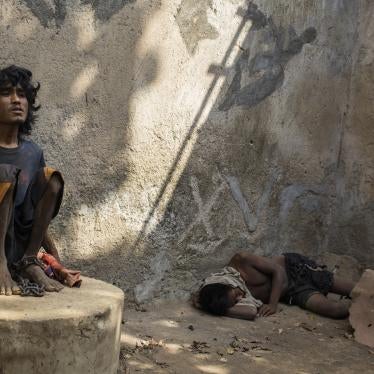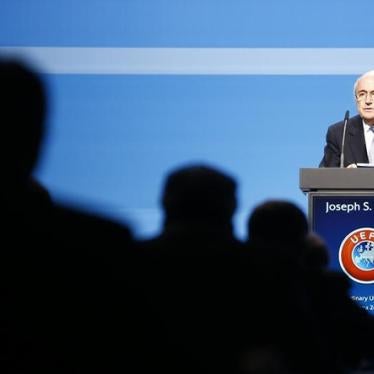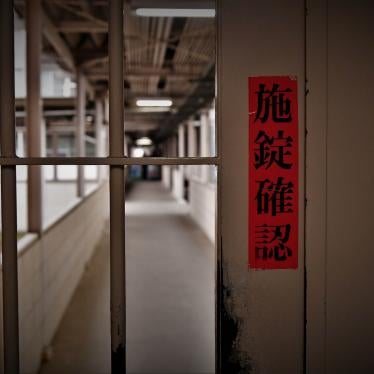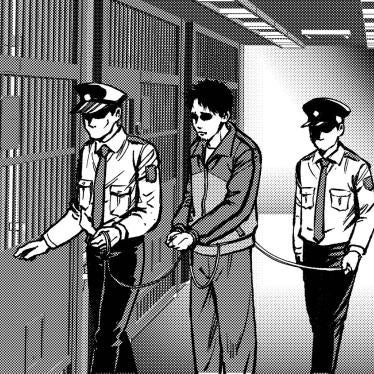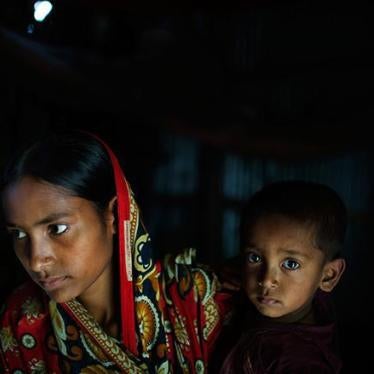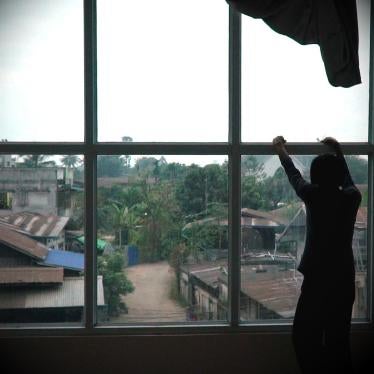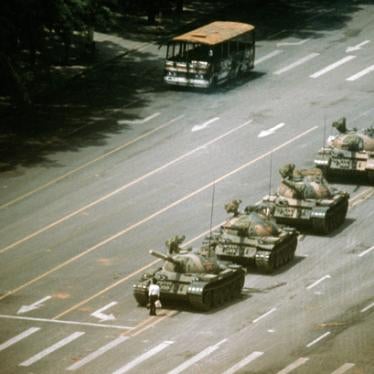(ナイロビ)中央アフリカ共和国の多くの障がい者たちは、2013年から始まった武装組織による村落襲撃のなかで置き去りにされ、生き延びるために大変な苦労をしたと、ヒューマン・ライツ・ウォッチは本日述べた。国内避難民のキャンプに何とかたどり着いた場合でも、衛生設備、食料や医療支援を利用しにくい。ヒューマン・ライツ・ウォッチが今回公開した動画では、この紛争の中で苦闘する実態を障がい者自身が語っている。
国連安全保障理事会は2015年4月28日、中央アフリカ共和国への国連平和維持ミッションを更新する予定だ。本PKOの任務には、障がい者のニーズに特に配慮するとともに、障がい者への人権侵害を報告してその発生を防ぐことが初めて盛り込まれる。
「中央アフリカ共和国の今回の抗争で最も見過ごされていることの1つが、障がい者の孤立、置き去り、ネグレクトだ」とヒューマン・ライツ・ウォッチの障がい者の権利調査員クリティ・シャルマは述べる。「今回の安保理の決定は、障がい者のニーズの可視化に役立つだろう。」
ヒューマン・ライツ・ウォッチは調査結果を安保理理事国、国連機関、人道団体向けに何度もブリーフィングしてきた。中央アフリカ共和国の緊急対応に詳しいある国連当局者はヒューマン・ライツ・ウォッチにこう述べた。「国連は障がい者問題に十分な注意を払っていない。今すぐ取り組みを強化すべきだ。人道援助に差別があってはならない。」
中央アフリカ共和国は2013年の初めから深刻な危機に見舞われている。ムスリム主体の反政府勢力「セレカ」が、民間人の広範な殺害、家屋への放火や略奪などの重大犯罪を犯しながら軍事作戦を展開し、権力を掌握したためだ。2013年半ばには「アンチバラカ」を名乗る勢力が組織され、セレカとの抗争が始まった。アンチバラカは、首都バンギなど西部でムスリム住民への大規模な報復攻撃を行った。この紛争で数千人が死亡し、障がい者を含む数十万人が住むところを離れざるをえなくなった。
「抗争の結果、障がい者はすべてを失いました。車いすも、家も、生計を立てる手段もすべてです」と、バンギにあるムポコ国内避難民キャンプの障がい者団体代表シンプリス・レンギ氏はヒューマン・ライツ・ウォッチに述べた。「人道団体の全面的な支援がなければ、元の場所に戻ることは不可能です。」
さらにレンギ氏は「障がい者は自宅を建て直し、食糧を確保し、医療を受け、生計を立てる手段を作り出すための支援を必要とします」と指摘した。ムポコ・キャンプでの自発的帰還は4月24日には始まる予定だ。暫定政権が避難民キャンプ閉鎖と帰還支援に着手する現在、障がい者向けの支援や援助はさらに重要性が増す。
1月13日から20日と4月2日から14日にかけて、ヒューマン・ライツ・ウォッチはバンギ、ボヤリ、ヤロケ、ボッセンプテレ、カガ・バンドロで49人に聞き取りを行った。うち30人は身体、感覚、心理社会または発達に関する障がいを持つ人びと、その家族、政府当局者や外交官、援助機関や地元の障がい者団体の代表者だ。
ヒューマン・ライツ・ウォッチの調査により、少なくとも96人の障がい者が置き去りにされるか、避難できない状態にあったこと、また11人がボヤリ、ヤロケ、ボッセンプテレ、カガ・バンドロで殺害されたことが明らかになった。これらは氷山の一角とみられる。障がい者のほとんどが、人気のなくなった地区や村で、食料や水がほぼない中で数日から数週間を過ごしている。期間が1ヶ月に及ぶケースもいくつかあった。インタビューの対象となった、身体または感覚に障がいのある人びと、とくに置き去りされた人びとは、馴染みのないでこぼこの土地で暮らしていけない場合が多かった。
小児麻痺を患った中央アフリカ共和国南西部の町グエン出身のハママトウさん(13)はヒューマン・ライツ・ウォッチに対し、村が襲撃されたときに兄の背におぶられて避難した。しかし兄は途中で疲れて動けなくなった。「兄に言いました。『スレイマン、私を置いてあなたは逃げて』と。殺されなかったら戻ってくると兄は言いました。しかし二度と戻ってきませんでした。 」
2週間後にアンチバラカの部隊に発見されたハママトウさんは、そのときの出来事をこう語った。「兵士たちは言いました。『動物がいるぞ。ここで殺してしまえ。』」しかしある兵士がそれを止めさせたためにハママトウさんは助かった。
バンギから北西300kmにあるボッセンプテレ・カトリック病院長のベルナール・キンヴィ神父は、司祭たちとともに、アンチバラカにより約80名が犠牲となった2014年1月の虐殺の生存者を何日もかけて探したが、ボッサンテレで置き去りにされた50人のうち17人が障がい者だったと述べた。たとえば、死んだと勘違いされて置き去りにされ、川床で複数の遺体のあいだで5日間横たわっていた視覚障がい者の高齢女性や、虐殺から5日間隠れていたところを発見された小児麻痺の子どももいた。ハンセン病で両手両足を失った高齢男性が、虐殺後何日もしてから自宅で置き去りなっているのを見つけられたケースもある。
中央アフリカ共和国は極めて深刻な危機に見舞われているものの、現在世界各地で様々な人道危機が多発しているために、人道支援機関は多大な負担を抱えている。そのため、国連は中央アフリカ共和国の状況を最悪級に分類しているものの、同国への人道支援の金額は不十分だ。国連人道問題調整事務所(UNOCHA)によると、2015年に入ってから中央アフリカ共和国は1億2,600万米ドル(127億円)を受け取った。しかしこの金額は、同国の戦略的対応プランに必要な6億1,300万米ドル(736億円)の20%に満たない。
援助資金の制約の結果、人道支援機関は障がい者特有の問題に対処することができていないことが多い。ヒューマン・ライツ・ウォッチが国連と非政府の人道支援機関8組織に話を聞いたところ、障がい者関連データを組織的に収集しているところは1つもなかった。また、組織の計画に障がい者のニーズがしっかり組み込まれていることもなかった。
国連と非政府の人道支援機関、および暫定政権は、危機対応にあたり障がい者のニーズを考慮に入れるべきであり、計画策定と意志決定プロセスに障がい者自身を参加させるべきだと、ヒューマン・ライツ・ウォッチは指摘した。こうしたきわめて重要な作業が実行されるためにドナー側は、障がい者をインクルージョンした人道事業に対して、資金提供をすべきだ。
人道支援機関と暫定政権は、障がい者関連のデータを体系的に収集し、政策決定と援助計画に障がい者をしっかり位置づけるべきだ。全国的な対話の場として5月4日から10日の予定で開かれるバンギ・フォーラムには、障がい者も参加するべきだ。また政府は、8月に予定されている選挙に障がい者が完全参加できるよう、措置を取るべきである。
「障がい者は、紛争被害者の支援に取り組む援助機関やPKOミッションから見過ごされることが多かった」と、前出のシャルマ調査員は述べた。「国連と支援機関は職員に研修を行い、障がい者が避難先のキャンプで、そして、帰還後は地元で、すべてのサービスを平等に利用できるようにすべきである。」
Fleeing Violence
At the height of the conflict in early 2014, people with disabilities were neglected in the large- scale evacuation of tens of thousands of Muslims from the capital, Bangui, and towns and villages across western parts of the Central African Republic. The commercial trucks used to transport people to camps for internally displaced people or refugee camps in neighboring countries were high off the ground, making them extremely difficult to access for people with physical disabilities unless they had assistance. In the chaotic and desperate flight, there was often little or no help to board the trucks.
When more than 1,500 Muslim survivors fled the city of Bossemptélé in March and April 2014 in commercial trucks, Human Rights Watch found that at least 17 people with disabilities, mostly children who had survived polio, were left behind.
Those who managed to board were often unable to take their wheelchairs or other mobility devices since there was limited room in the vehicles and boarding was chaotic, with some only having minutes to climb on or risk being left behind.
A number of people with disabilities decided to stay behind rather than lose their wheelchairs. “How will people with disabilities move around without their tricycles once they reach the camps?” one disability rights advocate said. “They preferred to die with dignity and pride at home.”
Dieudonné Aghou, vice-president of the National Organization of the Association of Persons with Disabilities (Organisation Nationale des Associations des Personnes Handicapées, ONAPHA) told Human Rights Watch: “The Seleka would attack very suddenly, driving up at high speed in their 4x4 trucks, whoever couldn’t flee quickly was attacked. Even in the second phase, during the anti-balaka reprisal attacks, families fled leaving behind relatives with disabilities. In the list of victims, there are many people with disabilities, yet no credible organization is working on our needs in [this] conflict.”
Obstacles in fleeing
A key challenge in escaping was the absence of assistive devices such as wheelchairs, tricycles, or crutches, which were lost in the chaos, left behind, or looted. One man with a physical disability living in Bangui told Human Rights Watch: “People broke down the door, looted my home and took my wheelchair. If I could walk, I could have defended myself.” Another challenge was inaccessible terrain, especially in rural areas where the only safe place to hide was in the bush.
In Kaga Bandoro, Henry Gustave – a polio survivor who cannot walk – told Human Rights Watch how he fled after the Seleka and anti-balaka started fighting in town in 2014: “I used my tricycle to move fast and hide in the bush. With my family we fled into the bush and stayed there for two months.” However, they had to move after they were attacked again by ethnic Peuhl herders who sometimes ally themselves with the Seleka. “When we were attacked, I wanted to take the tricycle, but it was too heavy and cumbersome to move in the bush, so we had to abandon it. Since then my uncle went back to get it but only the frame is salvageable, the rest of it is destroyed.”
Many people with physical or sensory disabilities found the prospect of the journey too daunting so they decided to stay back. Jean-Richard, a man with a physical disability, told Human Rights Watch: “In my state I couldn’t leave [without assistance]. Everyone left but I stayed back and locked myself in the house. I stayed there for a week without any food.”
Some people with disabilities chose to stay in their homes, believing that because of their disability, attackers would spare their lives. But in some cases people with disabilities who were unable to flee were killed by the attackers. A blind man and another man with a physical disability were among 11 people killed in the November 2013 Seleka attack in Ouham-Bac in northwestern Central African Republic. Relatives who later found the blind man’s body told Human Rights Watch that it appeared he had been dragged from his hiding place and executed.
Abandonment
Families of people with disabilities are faced with a difficult choice during a conflict, Human Rights Watch found – often a split-second decision, either to flee and save themselves or to risk being killed to save a relative with a disability. As a result, people with physical or sensory disabilities were often left behind.
Human rights defenders and disability rights advocates told Human Rights Watch that, based on information they were able to collect in their own districts, they found 57 people with disabilities abandoned in homes in Bangui. The totals are probably higher.
Ambroise, a 27-year-old man with a physical disability from Bangui, described what happened on December 9 when the Seleka entered his neighborhood: “The Seleka came and started killing people. I was fast asleep when I heard gunshots and woke up to find myself alone at home. My parents had fled without me. I started shouting and crawled to the entrance of my house but when I looked outside, there was no one. I stayed alone for a day until a young boy passed by. I started crying when I saw him and begged him; ‘Please help me! If you leave me, I will die.’ The young boy feared for me and agreed to carry me on his back till the airport [the camp for displaced people].”
Lack of information or awareness
Since the attacks occurred without warning, people who are deaf or have a psychosocial or intellectual disabilities simply did not hear, know about, or understand what was happening. Human Rights Watch documented the case of a tailor in Bangui with a mental health condition who was shot and killed by the Seleka because he continued to work at his shop in the market while everyone else fled. One of his acquaintances said: “He just didn’t understand.”
The situation of people with psychosocial or intellectual disabilities has been particularly ignored, since even domestic disability rights organizations focus almost exclusively on people with physical disabilities and frequently don’t include people with psychosocial or intellectual disabilities in their work.
Life in Camps for Displaced People
Life in Bangui’s M’Poko camp for internally displaced people, adjacent to the airport, and in Muslim enclaves, such as the one in Yaloké, is difficult for all, but people with disabilities face additional challenges in meeting their basic needs such as food, sanitation, and health care. Similar problems are likely to be found in camps across the country as the number of internally displaced people soars in the central part of the country.
Local authorities and humanitarian agencies are not systematically collecting data on people with disabilities in either of the sites identified above. Local groups for people with disabilities have indentified 123 people with physical and sensory disabilities in the M’Poko camp. Given that there are 18,300 people in the camp, as of early April, and no data on people with psychosocial or intellectual disabilities, it is likely that this figure seriously underestimates the problem.
For people with physical or sensory disabilities, displacement camps can be hard to navigate. People with disabilities interviewed said that they were unable to make their way to food distribution sites as the location was not accessible or by the time they made their way to the site with assistance, the distribution was already over. Food distributions in M’Poko camp ended in the first half of 2014.
Following the government’s decision to return people from M’Poko camp in Bangui to their homes, aid organizations will facilitate their return with food rations for two months, and four months for the most vulnerable. They will also provide them with about 90,000 CFA (about US$150, which is the equivalent of rent for six months), plastic tarp, a hygiene kit for women, and three mosquito nets.
Once they are back in their neighborhoods, aid organizations will work with local authorities to ensure that families have access to services such as medical care and schools. It will be essential to fully include people with disabilities in these efforts.
Sanitation and health
The environment in the M’Poko camp in Bangui, as in other displacement sites, is inaccessible, with uneven surfaces and open sewage drains that make it difficult for people who use wheelchairs or who are blind to move around without assistance.
Accessing basic necessities such as latrines can be difficult as some are not fully accessible and often people with physical disabilities have to crawl on the ground to enter, exposing them to potential health risks. Jean, a man with a physical disability living in M’Poko camp, said: “My tricycle doesn’t fit inside the toilet so I have to get down on all fours and crawl. Initially I had gloves for my hands so I didn’t get any [feces] on them but now I have to use leaves.”
For people who are blind, moving around the camp without assistance can be extremely dangerous, as they can fall into filthy open sewage drains or burn themselves on open fires. Human Rights Watch heard of several cases in which blind people in the M’Poko camp had been burned by open fires or boiling water. Aimé, a blind resident of M’Poko camp and a popular musician, told Human Rights Watch, “Sometimes I become so angry and discouraged by the difficulties of living here that I just stay inside the whole day.”
Without mobility aids, many people with disabilities are forced to crawl on the ground to move around, and as a result, they are at great risk of life-threatening infections, such as respiratory problems related to inhaling excessive amounts of dust.
People with disabilities also face increased barriers in accessing basic medical care even when it is provided in the camp. This not only concerns people with physical disabilities who may be unable to go to the clinic but also extends to people with sensory disabilities.
The M’Poko camp medical clinic has no one to facilitate communication with deaf people. As a result, deaf people who cannot read or write and are not accompanied by a relative or friend who can assist with communication may hesitate to seek medical help or find it difficult to communicate if they do.
Gilbert Nguerepayo, a sign language interpreter who used to live in the Don Bosco camp in Bangui, told Human Rights Watch: “Humanitarian organizations do not pay enough attention to deaf people. Medical care is a real problem. There is no one to support them and they face difficulties in communicating.” At the request of deaf people, Nguerepayo often facilitated communication between them and doctors in his camp but deaf people in M’Poko had no such support, as there are no sign language interpreters in the camp. He is called in by the local disabled persons’ organization in M’Poko to provide sign language interpretation for events but not for individual cases. Nguerepayo is one of the few sign language interpreters in the entire country, and is largely self-taught.
In the Muslim enclave in Yaloké, access to medical care and nutrition has been poor, particularly for people with disabilities. Mamadou, a 14-year-old polio survivor, fled his home on the back of a donkey. Mamadou’s father told Human Rights Watch: “We had a donkey to carry Mamadou but it died on the way. We had to negotiate to buy another donkey but when we came across the anti-balaka, they stole the donkey from us. We didn’t know what to do so my wife and I would take turns carrying him. Mamadou was crying like it was never going to end.”
Due to the uneven and bumpy terrain, Mamadou fell a few times during the journey and sustained injuries that went untreated and prevent him from even supporting himself with a cane. “Before [the war] Mamadou was better; now he can’t even walk,” his father said. Once he reached the Yaloké enclave, his health deteriorated because, according to his family, he had to crawl on the ground and had little to eat. Although his family took him to the nearby clinic, only mild painkillers were available.
When Human Rights Watch interviewed Mamadou in January, he weighed less than 8 kilograms and according to the doctor at the Bossemptélé Catholic mission was suffering from an acute pulmonary infection due to the dust he inhaled crawling on the ground. The dire living conditions and lack of access to medical care has led to 53 people among the displaced community in the camp, including children and adults with disabilities, dying from malnutrition, respiratory illnesses, and other diseases.
According to the two leading medical assistance organizations, due to the scarcity of trained professionals, mental health care and support services for people with psychosocial disabilities are limited. In the areas that Human Rights Watch researched, there are no community-based mental health services available and only one hospital in Bangui provides a few psychiatric medications. Even prior to the conflict, there was an acute shortage of mental health services with only a handful of professionals and few services available; however the need for mental health care has increased. The conflict has traumatized a significant part of the population, leading to a likely increase in mental health conditions including post-traumatic stress disorder and depression.
In one case, a 17-year-old-boy with an intellectual and physical disability, Suleiman, was fleeing when he saw his uncle being brutally killed. Suleiman appeared to be traumatized by what he saw but has never received any counseling or psychosocial support. He told Human Rights Watch: “My uncle’s death in front of my eyes continues to scare me…When I sleep, I have nightmares that bring back the images of the events I lived. I haven’t spoken to anyone about it.” While one medical nongovernmental group is considering providing mental health support for victims of gender-based violence, these services would not help others with mental health problems.
Access to food
In displacement sites of M’Poko, Yaloké, and Kaga Bandoro, people with disabilities, especially those without families, are often unable to obtain food during distributions as they typically find out too late or are unable to go because the location is inaccessible. People with disabilities living in the M’Poko camp organized a system of food distribution among themselves where a few camp leaders would collect food during distributions and then hand it out to all people with disabilities who were unable to access the distribution site. However, the transitional government’s decision to end food distributions has proved extremely difficult for people with disabilities, especially those with no family support, and contributes to malnutrition.
Rodrigue, a young man with a physical disability who lives alone in M’Poko, has to pay someone every day to take him in a cart outside the camp, where he sits all day in the sun to beg for money for food. Once back in the camp, he is dependent on the availability and good will of his neighbors to cook food for him and bring him water.
Once the M’Poko camp shuts down and people return home, people with disabilities like Rodrigue, are likely to continue to have difficulty in getting food and meeting other basic needs. After the food provided by aid groups to returning families runs out, families will have to supply their own food. For people with disabilities, especially those who were abandoned by their families, this may prove particularly difficult.
For some people with disabilities living in Yaloké and Kaga Bandoro, even being able to benefit from food distributions is difficult. Noel’s right hand was amputated in 2014 after he was shot by Seleka fighters outside of Kaga Bandoro. “There is not enough to eat and when we are receiving assistance I don’t have the strength to – and can’t carry – my goods,” he said.
Access to education
Human Rights Watch found that very few children with disabilities are enrolled in schools in camps like M’Poko. The school in the M’Poko camp has over 3,797 children enrolled; of whom only 14 have disabilities. While the school is wheelchair-accessible, the route to the school is not. Children with physical disabilities cannot attend unless a family member takes them there and picks them up, and they have an assistive device. Without an assistive device, such as a wheelchair, children with physical disabilities can find it hard to sit all day on the floor.
The school’s staff told Human Rights Watch that some parents are hesitant to send their children with physical disabilities to the school as they fear that in case of an attack the children will not be able to flee. Children with sensory or intellectual disabilities are unable to attend the school because the school does not have teachers trained in inclusive methods.
“None of our staff is trained to teach children who are blind, deaf, or have other disabilities,” said a staff member working at the school. “So it serves no purpose to let children with disabilities come to this school.” The school staff has encouraged parents to enroll their children, but has not actively sought to enroll children with disabilities.
